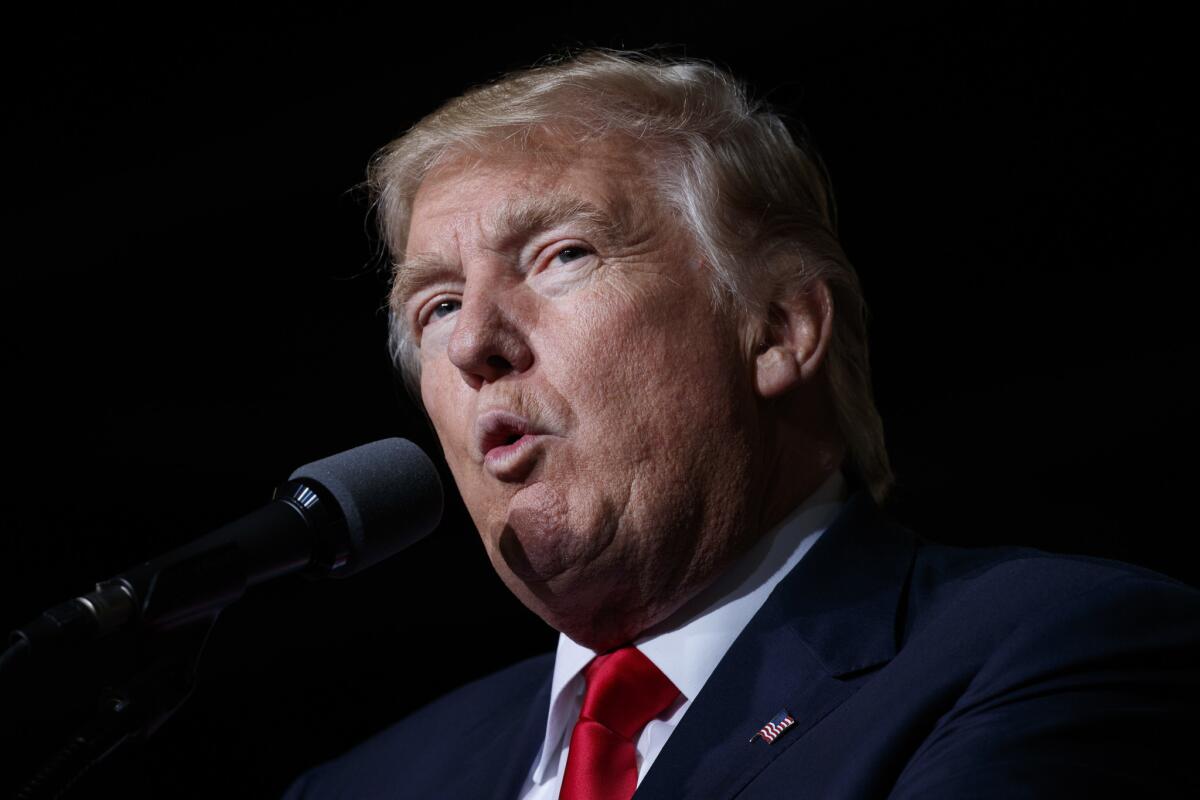Editorial: Trump moves to militarize a crisis, after pouring oil on the flames

- Share via
Declaring he was “your president of law and order,” President Trump on Monday said he was prepared to deploy U.S. troops to end the violence and vandalism that has accompanied a nationwide protest against police brutality.
The president’s remarks demonstrated anew that he has little understanding of why Americans have taken to the streets. They also reinforced the impression that he sees the current crisis as an opportunity for him to score political points in an election year with a new iteration of his 2016 claim that “I alone can fix it.”
The violence and property destruction that have occurred in recent days — including in Los Angeles — is heartbreaking. A different president would have been able to credibly lament that lawlessness, and call for measures to deal with it, with no one suspecting ulterior motives.
Trump has forfeited any such benefit of the doubt. In his remarks on Monday, as in previous comments, he expressed sympathy for George Floyd, whose death led to a murder charge against the former Minneapolis police officer shown kneeling on Floyd’s neck in a video that went viral. But Trump consistently has failed to recognize that Floyd’s death was the latest example of a pattern of police violence against African American men that in turn is a manifestation of entrenched and pervasive racism.
Trump’s obliviousness to that larger reality was shockingly evident in recent days. Last week he tweeted that “when the looting starts, the shooting starts” and said that the Secret Service was prepared to unleash “vicious dogs” on protesters at the White House. Both statements had ugly echoes of attempts to deprive African Americans of their civil rights.
Trump’s comments during this crisis also have been marked by a false machismo that will be all too familiar to those who remember his suggestion in the 2016 campaign that he would subject suspected terrorists to “a hell of a lot worse than waterboarding” and his advice to a police audience in 2017 that officers shouldn’t be “too nice” when they put suspects into a patrol car.
In a conference call earlier on Monday, Trump lectured a group of governors that they needed to arrest and imprison protesters. According to the New York Times, Trump said: “You have to dominate. If you don’t dominate, you’re wasting your time — they’re going to run over you, you’re going to look like a bunch of jerks.”
Most presidents would strive to keep blatant partisanship out of their handling of a national crisis. Not Trump. He has called Minneapolis’ Democratic mayor “the very weak Radical Left Mayor, Jacob Frey.” He told Democratic mayors and governors: “The World is watching and laughing at you and Sleepy Joe,” a reference to former Vice President Joe Biden. Trump added: “Is this what America wants? NO!!!”
If there was any lingering doubt that Trump sees this crisis through a political lens, it was dispelled when Trump walked across Lafayette Park — cleared of peaceful demonstrators by police and National Guard units firing tear gas and rubber bullets — to the historic St. John’s Church, the site of a fire Sunday night. Trump held a Bible and posed for photos.
The task of reining in Trump falls to the Republicans who still hold some sway with him. But to put it mildly, GOP leaders haven’t rushed to demand that Trump moderate his incendiary language. Those who have criticized the president’s comments have engaged in irritating understatement.
Sen. Tim Scott of South Carolina, the only black Republican in the Senate, said that Trump’s tweets were “not constructive.” Asked about Trump’s divisive online commentary last week, Senate Majority Leader Mitch McConnell (R-Ky.) said: “I generally don’t comment on the president’s tweets.” See no evil, hear no evil, speak no evil.
Ideally, Republicans in Congress — including House Minority Leader Kevin McCarthy — would rise above partisanship and recognize that Trump is a uniquely unfit occupant of the Oval Office and unworthy of reelection. But it was made painfully clear even before Trump’s impeachment that congressional Republicans, even those who privately held Trump in contempt, were reluctant to cross or criticize him under any circumstances. The only profile in courage was struck by Sen. Mitt Romney of Utah, the sole Republican to vote to convict Trump after the impeachment trial.
Still, McConnell and other Republican leaders, including those in state capitals, should be able to speak up forcefully when Trump’s trash talk threatens not only civility but also public order. They need to be the voices of reason now, stopping Trump from loosing the military on U.S. citizens and turning a bad situation into a horrific one.
More to Read
A cure for the common opinion
Get thought-provoking perspectives with our weekly newsletter.
You may occasionally receive promotional content from the Los Angeles Times.










